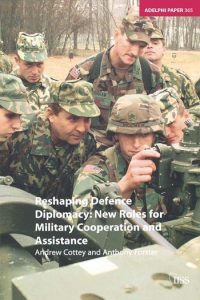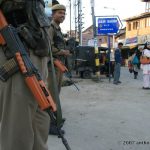
Defence diplomacy as a concept emerged in the post-Cold War era in order to deal with the new set of challenges that the international system faced. As a concept, it does not have a universally recognized definition. However, it largely encompasses the non-violent use of a state’s defence apparatus to advance the strategic aims of a government through cooperation with other countries. An important aspect of defence diplomacy is its evolving nature, not only do states adapt their content to the intentions and needs of their own security, but the concept itself may witness a shift in terms of what it largely encompasses. This very shift is highlighted by Andrew Cottey in his book, titled Reshaping Defence Diplomacy, New Roles for Military Cooperation and Assistance.
Andrew Cottey largely focuses on the changing nature of Western defence diplomacy. He provides a dichotomy between traditional and new defence diplomacy, wherein he highlights the change in the nature of activities that the concept envisages in itself. To put it briefly, traditional defence diplomacy encompasses activities focusing on strengthing one’s allies in order to counter the enemies. On the other hand, new defence diplomacy has three major aspects: engagement with potential enemies, support for democracy and human rights, and lastly a focus on developing peacekeeping capabilities in other states. The author takes the time scale of the 1990s to mark this shift from old to new. Through the course of his book, the author focuses on the above mentioned three aspects of new defence diplomacy highlights how the new defence diplomacy exists alongside the old and how there are tensions between the two. He further suggests that in wake of the September 2001 terrorist attacks there has been a shift back towards the old realpolitik defence diplomacy, wherein the major players in the international system have intensified military cooperation with a number of countries, especially the Central Asian states, despite their poor records on democracy and human rights.
In the first part of the book, the author essentially elaborates upon how defence diplomacy serves as means of ‘strategic engagement’ between former and potential enemies. There is a special focus on military cooperation with the two major powers, Russia and China. Before diving into the specifics, the author highlights how PfP (Partnership for Peace), a North Atlantic Treaty Organization (NATO) program aimed at creating trust between NATO and other states in Europe and the former Soviet Union, serves as a successful example of new defence diplomacy. The PfP has been able to overcome the cold war divisions and has paved the way for cooperation with and amongst Eastern European states.
Defence diplomacy in the form of strategic engagement with Russia and China has largely involved efforts to reinforce common interests, bring about transparency into defence relations and a consequent ‘disarmament of the mind’. The last aspect deals with changing the perceptions about the Western military as a threat by emphasising on common interests and challenges. Although the aim and activities of the new defence diplomacy of the West have been similar with reference to Russia and China, there is a major difference in the results it has yielded. This highlights a major problem of how the success of defence diplomacy is also dependent upon the larger political relations of the state. In the case of Russia, there has been consequent improvement in military cooperation especially with the establishment of the NATO-Russia Council. However, in the case of China, the success has been limited both in terms of its scale and substance. This is a result of political differences particularly over US military presence in Asia and China’s role as a weapon proliferator. Most importantly, if one takes up a Realist lens, the two countries experience the “rising power syndrome” (China) and the “existing power syndrome”(USA), which consequently makes cooperation especially military cooperation difficult to achieve.
The second part of the book addresses how defence diplomacy can be employed for the promotion of human rights and democracy in other countries. The promotion of democracy is seen not only as a means of supporting democratic values but also ensuring international security. The roots of this idea can be traced back to Immanuel Kant’s “Perpetual Peace” wherein he explains how democracies do not go to war with each other, as democracies encompass the rule of the people and according to Kant, people of most societies do not support the war. Hence, Western governments have sought to assist in depoliticising armed forces, civilianising defence ministries and securing effective civilian control of defence forces, particularly in Eastern Europe and Africa. However, this commitment of the West to use defence diplomacy as an instrument to promote democratic civil-military relations faces a major problem of “double standards”. On the one hand, Western governments played an important role in the democratic rebuilding of Germany and Japan, post the Second World War and Spain in the 1980s, whereas on the other, Western governments continue to support and provide military assistance to authoritarian regimes, especially the oil-rich states of Saudi Arabia, Nigeria, Jordan and Israel. This highlights the double standards and the hypocritical nature of the West and thus, undermines the narrative of the new defence diplomacy.
Lastly, the author explains how Western governments have employed defence diplomacy since the 1990s in supporting partner countries in developing peacekeeping capabilities. The NATO and EU have encouraged countries of the region to contribute to peacekeeping operations and have used defence diplomacy as a means of supporting them in developing the required military capabilities. Most importantly, contributing to peacekeeping missions has become a prerequisite for aspiring NATO members. In the case of Africa, there has been an attempt to deal with the security problems by developing regional conflict prevention, management and resolution capabilities. This highlights the Western reluctance to intervene in African conflicts, as highlighted by the failure of the international community to intervene during the genocide in Rwanda in 1994, and the desire within Africa to assert its independence.
The book explores the three major facets of the new defence diplomacy that has taken stride since the 1990s. In doing so the author not only highlights the main activities undertaken with respect to these three aspects but also elaborates upon the consequent dilemmas faced by them. In the case of strategic engagement with former or potential enemies, there is always a sense of mistrust involved, owing to past rivalries. Moreover, military cooperation with potential enemies (new defence diplomacy) exists alongside the cooperation with allies (new defence diplomacy). As a result, the concerns of security and mistrust continue to loom large. Similarly, in the case of the promotion of democracy and human rights, the Western governments find themselves engaging in double standards by continuing to support authoritarian regimes with weak records of human rights, in order to meet their larger strategic concerns. Lastly, the Western attempts of developing peacekeeping capabilities in other states, is seen as a threat to state sovereignty and hence, governments continue to vary of Western intervention in their countries.















